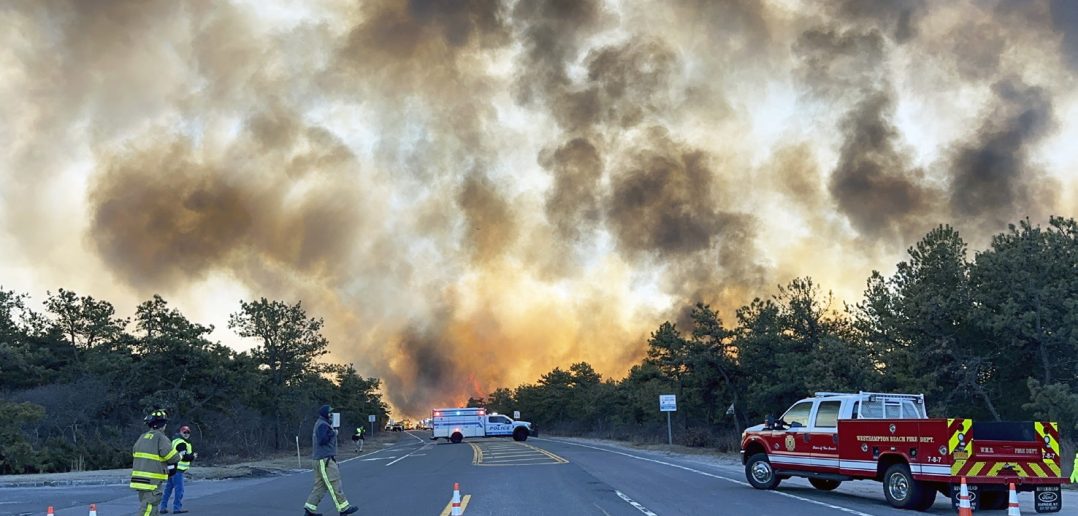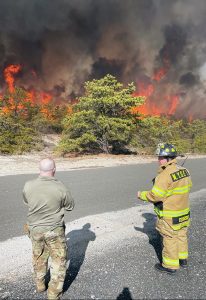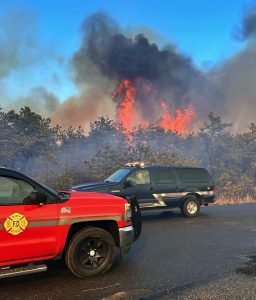WESTHAMPTON BEACH — CSEA members and New York State Division of Military and Naval Affairs (DMNA) firefighters Michael Gadman and Kenneth Ruddick were in the training room at Francis S. Gabreski Airport with their colleagues when they looked out the window and saw black smoke in the distance.
At first, the workers thought it was a plane crash. Regardless, they knew it was time to mobilize and respond to the situation.
Gabreski Airport is a central dispatch, which means firefighters based at the airport supply mutual aid to firefighters in the surrounding area.
Gadman, a station captain at the civil-military airport, learned through communication with the Westhampton Beach Fire Department that state firefighters were responding to a brush fire. Gadman informed the Westhampton firefighters that 11 firefighters from Gabreski Airport were already in transit.
And what a fire it was.
According to local media, ultimately the fire stretched over 2 miles and burned more than 400 acres of land.
CSEA firefighters were the first to arrive at the scene.
“Fortunately, it was National Guards Weekend, so we had a lot of extra people at the airport,” said Gadman. “There are 11 of us that serve as both state firefighters and in the National Guard. Every one of us was here [at the airport]were on duty the day of the fire.”
As the fire progressed, additional state firefighters were called into work, which put 19 CSEA members from Gabreski Airport at the scene.
They were not the only CSEA members fighting back the fire. More than 80 fire departments across Long Island were dispatched, with several counting CSEA members among their ranks.
Firefighters fought back the main body of the brush fire for about five hours. Small fires still popped up into the early morning, but since those spots were in areas that were already burned, they were not a threat.
At one point, the fire went right over the heads of CSEA state firefighters.
“It was orange and smoky; we had to retreat back to the base,” said Ruddick, a state firefighter.
The fire passed over the group again when they were back at the airport base protecting the police aviation, civilian hangers and airport property from the fire.
Outside of being on the ground directly fighting back the flames, CSEA state firefighters directed where the helicopter pilots would drop water through the airport base’s control tower.
“To better coordinate the efforts of all the fire departments on site, Mike [Gadman] would relay information coming from the airport control tower to other fire departments on the ground through a radio system; the other departments don’t have the ability to communicate with the Gabreski Airport tower,” said Ruddick.
The state firefighters were also responsible for the continued operation of fire departments responding to the fire. The tanker truck that Ruddick was operating carries 4,000 gallons of water, which were used to replenish the water supply of firefighters.
According to local newspapers, fire investigators determined that the brush fire was caused by a family making s’mores. The people had used cardboard to light the fire.
To prevent potential catastrophic events, firefighters suggest that residents abide by the state’s burn ban, which is a temporary restriction on outdoor burning implemented to reduce the risk of wildfires, especially during dry or high-risk weather conditions.
“This time of year, it’s usually cool, dry, windy, and there’s low humidity,” said Ruddick. “No matter what the conditions, state firefighters are here full time and we’re always ready to go.”
As this edition was going to press, CSEA was fighting to include a 25-year retirement plan for DMNA firefighters in the New York State Budget, which was still being finalized. The 25-year retirement plan would give DMNA firefighters the fairness in their retirement benefits that other professional firefighters receive. Visit cseany.org/issues to learn more.
— Wendi Bowie








